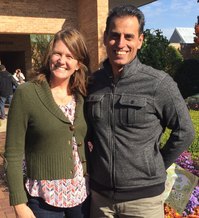
I have friend whose middle name means “happy”. We’ve been friends since we were fourteen; he has known me longer than anyone outside of my family in the town where I now live. His father, a gentle man with olive skin, came to know Christ after the rest of his family had already done so. There is nothing that could’ve made my friend more happy. His father is from Syria.
I have a friend whose name means “victory”. She and I have shared tea together often, engaging in long conversations as she held my hand, her eyes full of tears, her intelligent mind struggling to learn our language. I have another friend whose name means “one who laughs”, who wears an almost constant wide smile (pictured above) and just moved to a small midwestern town to be a pastor. Both of these friends are from Iran.
I have a friend whose name means “bright, shining one.” She also wears a huge smile, showing startling white teeth against her beautiful dark skin. She carries herself with dignity, dresses beautifully, and I admire her greatly. She is from Sudan.
Each of these friends live here, not far away. They, or their parents, were migrants: “people on the move”. Each left what was home, some out of desperation. Each has changed my life. Each works hard to make a difference for good in the lives of those around them. Each carries a story that needs to be told.
And yet each carries the weight of family members who suffer far away. Their families live in some of the countries currently banned from receiving visas to immigrate to the US, despite the horrors at home.
Another friend, whose name means “hope” in her language, is now not under the revised ban but is still treated differently because of her religion and style of dress. We’ve met at the park often, treats spread out on a faded picnic table as we talk together in careful English. She is from Iraq.
I care about these people. Wanting to know more, I just read a fascinating book entitled, The New Odyssey: The Story of the Twenty-First-Century Refugee Crisis by Patrick Kingsley after reading an excellent summary of it here. It tells eye-witness accounts of real people, people with children and jobs and hearts, trying to flee war, poverty, dictatorship, torture, starvation, and other forms of suffering–at great risk to their very lives. It answers the question, “Why?” Why do they flee?
And even harder–Why do they die trying?
Yet it doesn’t answer every “why”. Why does our country try to shut its doors when we have land and wealth in abundance? Why do we discriminate against some when all are created in the image of God? Why was I born here, and not there, so that I can ignore–if I so choose–what it means to suffer?
Why am I not doing more to care about those who are not all that far away?
These friends that I have, they have given me hope, happiness, and laughter. What can I do to help those they love and care about–people with names who are dying because we stand with our hands over our ears and our eyes shut?
They long for hope. I know hope. I will do more to help them.
Hope and Be.Longing.
What can you do to listen to the cries of a refugee or immigrant?
“For I was hungry and you gave me food, I was thirsty and you gave me drink, I was a stranger and you welcomed me, I was naked and you clothed me, I was sick and you visited me, I was in prison and you came to me.” Then the righteous will answer him, saying, “Lord, when did we see you hungry and feed you, or thirsty and give you drink? And when did we see you a stranger and welcome you, or naked and clothe you? And when did we see you sick or in prison and visit you?” And the King will answer them, “Truly, I say to you, as you did it to one of the least of these my brothers, you did it to me.” (Matthew 25:35-40)

Leave A Comment